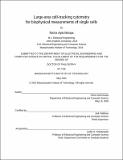| dc.contributor.advisor | Joel Voldman. | en_US |
| dc.contributor.author | Apichitsopa, Nicha. | en_US |
| dc.contributor.other | Massachusetts Institute of Technology. Department of Electrical Engineering and Computer Science. | en_US |
| dc.date.accessioned | 2020-09-03T17:41:49Z | |
| dc.date.available | 2020-09-03T17:41:49Z | |
| dc.date.copyright | 2020 | en_US |
| dc.date.issued | 2020 | en_US |
| dc.identifier.uri | https://hdl.handle.net/1721.1/127012 | |
| dc.description | Thesis: Ph. D., Massachusetts Institute of Technology, Department of Electrical Engineering and Computer Science, May, 2020 | en_US |
| dc.description | Cataloged from the official PDF of thesis. | en_US |
| dc.description | Includes bibliographical references (pages 96-106). | en_US |
| dc.description.abstract | Utility of single-cell biophysical markers is often limited due to the low-specificity nature of biophysical markers and lack of existing techniques which can test multiple biophysical characteristics for single cells. To address this challenge, I developed a multiparameter intrinsic cytometry approach which integrates multiple label-free biophysical measurements into a versatile (can combine techniques across domains) and readily extensible (to measure more than two biophysical markers) platform for single cell analysis. The proposed multiparameter cell-tracking intrinsic cytometry utilizes label-free microfluidic techniques to manipulate cells such that information regarding their biophysical properties can be extracted from their spatiotemporal positions. Furthermore, this technique utilizes cell tracking to extract and associate the biophysical markers for single cells. The specific instantiation of the cytometry platform can measure up to five intrinsic markers of cells, and has facilitated the quantitative investigation of label-free cell profiles and classification of cell types and functional states. The applications of this approach were extended by leveraging digital holographic microscopy and deep learning technologies to monitor cells in a large field of view, enabling rapid and high-throughput assessment of biophysical phenotypes. | en_US |
| dc.description.statementofresponsibility | by Nicha Apichitsopa. | en_US |
| dc.format.extent | 106 pages | en_US |
| dc.language.iso | eng | en_US |
| dc.publisher | Massachusetts Institute of Technology | en_US |
| dc.rights | MIT theses may be protected by copyright. Please reuse MIT thesis content according to the MIT Libraries Permissions Policy, which is available through the URL provided. | en_US |
| dc.rights.uri | http://dspace.mit.edu/handle/1721.1/7582 | en_US |
| dc.subject | Electrical Engineering and Computer Science. | en_US |
| dc.title | Large-area cell-tracking cytometry for biophysical measurements of single cells | en_US |
| dc.type | Thesis | en_US |
| dc.description.degree | Ph. D. | en_US |
| dc.contributor.department | Massachusetts Institute of Technology. Department of Electrical Engineering and Computer Science | en_US |
| dc.identifier.oclc | 1191624346 | en_US |
| dc.description.collection | Ph.D. Massachusetts Institute of Technology, Department of Electrical Engineering and Computer Science | en_US |
| dspace.imported | 2020-09-03T17:41:48Z | en_US |
| mit.thesis.degree | Doctoral | en_US |
| mit.thesis.department | EECS | en_US |
